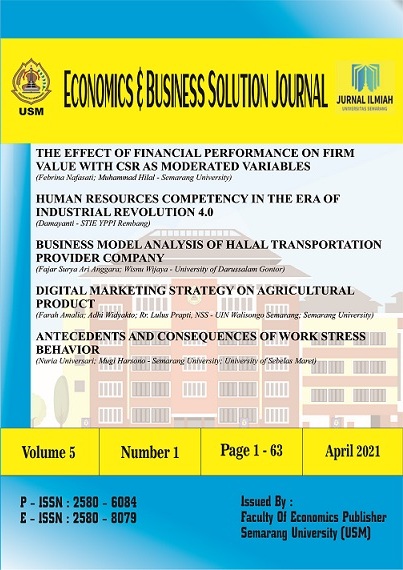Human Resources Competency in the Era of Industrial Revolution 4.0
DOI:
https://doi.org/10.26623/ebsj.v5i1.3334Keywords:
human resources, competence, industrial revolution 4.0 and technologyAbstract
An era of technological disruption is marked by digitization in various lives. Apart from offering benefits, the industrial revolution 4.0 also has challenges that must be faced. The challenges faced by a country when implementing the 4.0 industrial revolution are the emergence of resistance to changes in demographics and social aspects, instability in political conditions, limited resources, risk of natural disasters and demands for the application of environmentally friendly technology. The PESTEL framework is the basis for considering political, economic, social, technical, environmental and legal factors to analyze challenges in the era of the industrial revolution 4.0. Indonesia needs to improve the quality of workforce skills with digital technology. The relevance of education and work needs to be adjusted to the development of the era and science and technology while still paying attention to aspects of humanities. It is important to identify in competency classification, including: 1) Technical competence consists of all knowledge and skills related to work, 2) Methodological competencies include all skills and abilities for general problem solving and decision making, 3) Social competence includes all skills and abilities as well as attitudes to cooperate and communicate with others, and 4) Personal competence includes social values, motivation, and individual attitudes. New literacy, leadership, team work, mental maturity and character, culture and entrepreneurship make HR function properly in the community. The development of thematic studies in various disciplines is linked to the real world, project-based learning, through general education (extra-curricular) programs, and internships/practical work and the important thing that can support it is foreign language skills. Thus, competent human resources (HR), critical thinking, lateral thinking and entrepreneurship can be realized.
References
Ahmad, I. 2018. Proses Pembelajaran Digital dalam Era Revolusi Industri 4.0. Direktur Jenderal Pembelajaran dan Kemahasiswaan. Kementrian Riset Teknologi dan Pendidikan Tinggi. Medan, 17 Januari 2018.
BKSTI ub.ac.id /wp-content/upload/2017/10/keynote Speker Drajad Irianto.pdf
Callahan, M. 2018. https://news.northeastern.edu/2018/12/13/heres-why-certificates-and-microcredentials-will-help-you-get-your-next-job/
Davies, R. 2015. Industry 4.0 Digitalisation for productivity and growth. http://www.europarl.europa.eu/RegData/etudes/BRIE/2015/568337/EPRS_BRI(2015)568337_EN.pdf.
Hecklau, F., Galeitzke, M., Flachs, S., & Kohl, H. 2016. Holistic Approach for Human Resources Management in Industry 4.0. Procedia CIRP, 54, 1-6.
Ismunandar. 2019. Peraturan-peraturan Baru yang Mendukung Prodi Inovatif. Direktur Jenderal Pembelajaran dan Kemahasiswaan. Kementrian Riset Teknologi dan Pendidikan Tinggi. Semarang, 3 Januari 2019.
Kagermann, H., Lukas, W.D., & Wahlster, W. 2011. Industrie 4.0: Mit dem Internet der Dinge auf dem Weg zur 4. Industriellen Revolution. http://www.vdi-nachrichten.com/Technik-Gesellschaft/Industrie-40Internet-Dinge-Weg-4-industriellen-Revolution.
Making Indonesia 4.0. 2018. Kementrian Perindustrian Republik Indonesia. http://www.kemenperin.go.id/download/18384.
Merkel, A. 2014. Speech by Federal Chancellor Angela Merkel to the OECD Conference.https://www.bundesregierung.de/Content/EN/Reden 2014/2014-02-19-oecd-merkel-paris_en.html.
Pannen, P. 2018. Mempersiapkan SDM Indonesia di Era Industri 4.0. Kementrian Riset Teknologi dan Pendidikan Tinggi.
Prasetyo, H., & Sutopo, W. 2018. Industri 4.0: Telaah Klasifikasi Aspek dan Arah Perkembangan Riset. J@ti Undip: Jurnal Teknik Industri, Vol. 13, No.1.
Suwardana, H. 2017. Revolusi Industri 4.0 Berbasis Revolusi Mental. Jati Unik, Vol 1, No. 2, 102-110.
Downloads
Published
Issue
Section
License
The journal holds the copyright for each article published with work licensed simultaneously under a Creative Commons Attribution 4.0 International License, which allows others to share the work with an acknowledgment of the authorship and early publication of the work in this journal.







